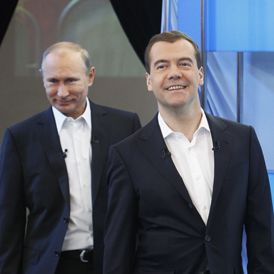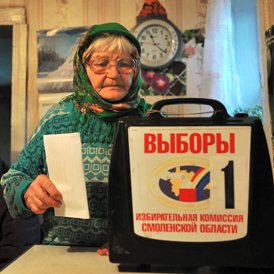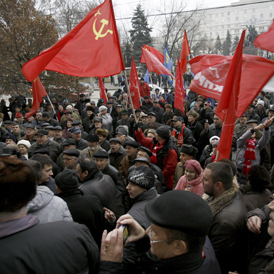Putin’s party wins Russian poll but dealt huge blow
As Russian voters cut the ruling party’s parliamentary majority, the Russia Foundation’s David Clark tells Channel 4 News that this could be the beginning of the end for the Vladimir Putin era.

With 96 per cent of the votes in, Putin’s United Russia has won 49.7 per cent, compared with more than 64 per cent four years ago.
The figures put the Communist Party as the biggest opposition force on 92 seats, with the A Just Russia party on 64 and the ultra-nationalist Liberal Democrats on 56.
The result marked the biggest electoral setback for Putin since he first emerged to national leadership in 1999, steadying the country after the chaos of the immediate post-Soviet period.
The result means that Mr Putin’s party, United Russia, now only has a 13-seat majority and has lost the two-thirds majority required to pass changes to Russia’s constitution.
Although Mr Putin is still likely to win a presidential election in March, the result could dent the authority of the man who has ruled for almost 12 years with a mixture of hardline security policies, political acumen and showmanship but who was booed following a martial arts bout last month.
Mr Putin and Dmitri Medvedev, who took up the presidency in 2008 when Putin was forced to step down after serving a maximum two consecutive terms, made a brief appearance at a meeting at United Russia headquarters.
“This is an optimal result which reflects the real situation in the country,” Mr Putin, 59, said. “Based on this result we can guarantee stable development of our country.”

David Clark, chairman of the independent Russia Foundation think tank and a former UK government adviser, told Channel 4 News that economic stagnation, a greater dependence on its natural resources and little prospect of reforms could lead to an Arab Spring-type uprising.
“There’s a sense that Russia is entering a period of stagnation. The last decade, the noughties, saw the country achieving growth of 7 to 8 per cent up until the financial crisis of 2008. It also put off a lot of dissent and secured rising prosperity,” he said.
“But it entered a difficult period in 2008 and hasn’t recovered from that, and Putin is not putting forward solutions for the country’s great problems.
“Russia is failing to modernise and diversify its economy. It is dependent on oil and gas more than it was a decade ago, and because of energy prices, it is very vulnerable to economic downturn. It is not attracting investment, and is at an 80bn investment loss this year.
This could well come to be seen as the beginning of the end of Putin’s rule – David Clark, Russia Foundation
“Because of this, there is a major brain drain, and it is very difficult for small and medium businesses to thrive.”
Mr Clark said that if and when Putin resumes the presidency in March, a failure to implement major changes across the board in Russian society could mean he faces dissent and, potentially, the end of his rule.
“It could well come to be seen as [the beginning of the end of Putin’s rule] unless he introduces reform projects to cure deep structural problems in Russia,” he said.
“Things can’t go on as they have been, but change seems to be impossible, because there is an entrenched elite whose interest is to block reform.
“I think that in the next few years, we will see a significant build-up of pressure, whether that will come in the form of rebellion, like what has been happening in Ukraine and Georgia, or in the Arab grass-roots movements, or whether it will come from a schism within the elite, where a reformist rebellion will seize the upper hand from Putin’s administration.
“There is an argument that neither will happen, because there is no base in Russian civil society from which to form the basis for this kind of movement. And currently, all the anti-reformists control all the levers of power.”

Rise of the Communist Party?
Any hope of deep reforms could come from the Communist Party, reinvigorated in this latest state election.
“Of all the parties in the Duma, the Communist Party now represents something most resembling an opposition party. It is the only party which is strong enough to exist independently without the consent of Putin,” Mr Clark said.
“It’s possible that they could now start to emerge, but up until now, they’ve played a cagey game by not putting themselves too far out of step with Putin. Whether they now feel confident to behave more independently, time will tell.”